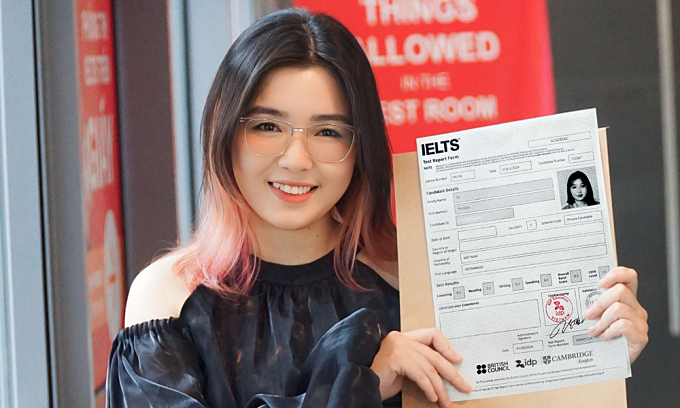Hanoi teacher achieves IELTS 9.0 by integrating English practice into daily habits
Ta Hoa, 29, reached this milestone on her fourth attempt on July 31.
She shared that she took multiple tests to assess her progress. In a previous test in April, she scored 8.5 overall, with her goal for the July test being to maintain this score while improving her Writing score from 8 to 8.5. Although her Writing score remained the same, her Speaking score exceeded expectations.
“I was quite surprised by the 9.0 in Speaking because I know my weakness is pronunciation. During practice, I only focused on being logical and fluent,” said Hoa, who holds a master’s degree in language teaching from the University of Canberra, Australia.
Hoa, a former student at Thai Binh Provincial High School for the Gifted, where she specialized in English, rated her listening skills as “poor” during her school years due to limited access to resources.
While at the Foreign Trade University in Hanoi, she spent her first two years improving her listening skills by watching English-language TV programs and movies. This practice helped her become more accustomed to native speakers’ intonation and fast speech.
“That was when my listening skills improved the most,” she recalled.
Ta Hoa shows her IELTS certificate with a perfect score of 9.0. Photo coutersy of Hoa |
After establishing a solid foundation, Hoa developed a habit of listening to English content for 10 minutes every morning and added extra sessions during her free time. For example, while doing her skincare routine, she would play 1-3 minute educational videos on YouTube or TED-Ed, listening to them repeatedly.
“It’s essential to consistently listen for 10-30 minutes every day on topics you’re interested in. Listening in small but regular amounts is more effective than listening a lot inconsistently,” she said.
For Reading, Hoa emphasizes the importance of mastering vocabulary and grammar. Once confident in these areas, candidates can aim for an 8.0 score. To reach higher scores, she advises developing advanced reading comprehension skills and acquiring extensive background knowledge.
Hoa pointed out that many students focus solely on translating words without grasping the author’s intended meaning or message. She attributes this to a lack of background knowledge.
For instance, when reading about biofuels, Hoa memorized key information, such as their sources (animals and plants) and advantages like environmental protection and reducing fossil fuel consumption.
“It’s essential to review and understand lessons in-depth rather than relying on shortcuts,” she said.
To improve her Speaking, Hoa integrates various activities into her daily life. She takes mock tests and uses scoring software to analyze her performance. By identifying weak areas, she targets them for improvement. Additionally, she frequently talks to herself in English. If an idea comes to mind while grading papers, she starts speaking about it, pausing to look up unfamiliar words if necessary.
With short videos she watches each morning, Hoa listens three or four times to memorize the content and then discusses it based on her understanding. This routine consistently helps her achieve a 9 in the lexical resource criterion, which evaluates vocabulary usage in IELTS Speaking tests.
“Just speak spontaneously to practice fluency; don’t worry about mistakes initially. Self-speaking and self-correction are very important,” she suggested.
Hoa admits that Writing is her weakest skill, as she has not yet incorporated it into her daily routine. She plans to read more, gather information, generate ideas, and revise her writing regularly.
In the coming months, she aims to dedicate more time to practicing Writing and plans to retake the IELTS test in November.


Comments are closed.